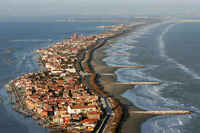Verdict and Recommendations: Case of Pellestrina island, Venice, Italy
6th SESSION OF THE INTERNATIONAL TRIBUNAL ON EVICTIONS (Venice, Italy, 28-30 September 2017)
Verdict and Recommendations: Case of Pellestrina island, Venice, Italy*
Verdict
Pellestrina, a small island between the lagoon and the sea, has had the same story as Venice for centuries: a fishing retreat during the barbarian invasions, a fishing population, and small craftsmanship (laces, boats).
Later, it has also developed tourism: initially by the Venice and the mainland inhabitants themselves, being known for the excellent fish and seafood cuisine, after also by people coming from outside areas and foregneirs.
The inland comprises three small towns: Portosecco, Pellestrina, San Pietro in tempo
The built environment is constituted by small 1-2-storey houses.
Two main typologies of evictions have been registered:
- The high tax burden on small property, the higher prices of goods, the disappearance of traditional jobs - supplanted by activities in the tourist industry, which offers easier and more remunerative returns - creates a structural social-economic change and a vicious cycle by which the touristic sector becomes dominant or the only income source. For the small owners, who have limited resources or income, the profitable tourist lease becomes the easy, if not the only option to mantain a steady income.
- The speculation based on the high demand for luxury tourism activities has led a de facto evictions promoted by real estate developers of societal and owner of large properties.
It follows that tourism is rarely condemned as a whole, either by the administrators, which continues to exploit this ‘easy’ sector and is uncapable of promoting, supporting or even envisioning alternatives, or by the inhabitants, who largely depend on it for surviving.
Through the local movement “No Grandi navi” (No big ships) tourism is discussed, although partially and mainly in connection with the problems concerning the environmental damaged provoked by the large cruises ships entering the lagoon. Uner discussions are a series of proposal more or less drastic.
Recommendations to National and Local Authorities
The long term perspective should address the touristic pressure on Venice:
- by changing the type of tourism and the culture of turism: Venice should not be treaded as a postcard and viewed by the big cruises boats, but for its intrinsic characteristics, which includes the appreciation of the fragile balance of the lagoon and its environmental context;
- by adopingt corrective measures for programming/scheduling the flows of tourists, but being careful of avoiding of discriminating tourists on the basis of income;
- by promoting a different form of tourist accommodation and experience offered to visitors, who are generally exploited and badly treated in terms of quality of food and accommodation unless they can afford very high costs.
In the immediate the following issues should be addressed:
- Housing policy that safeguard the inhabitants: tax breaks or concessions to those who leases to residents, such as a reduction of 25% of the municipal tax due by the owners when leasing to residential use.
- Housing policy which promoted the access to an adequate house to young couples and those with a low income.
- Safeguard, conversion and re-use of public assets for social and affordable housing, public spaces or activities which promote local development outside the tourist industry
- Land use policies, planning and building regulations, which limit the invasions of turist activities in the neighbourhoods by limiting the number of café/restaurants, souvenir shops and tourist related commercial units to be open nearby.
- Rigourous fiscal control on the allocation of social housing units, better enforcement of building regulations.
- Reduction of the extra costs due to the tourist load both in the production and consumption
- Promotion of new opportunities of employment by supporting new types of activities, not directly linked to tourism and introducing activities, which may have a tourist relapse but that also contribute to enanching the built and natural environment of Venise and its lagoon (maintenance, restoration of traditional boats, arts & craft, etc.).
- Concerning the specific case of Mr B., taken as emblematic of the situation in Pellestrina, a lawyer should be appointed in order to assert the right of the tenant transforming the tourist lease into the existing legal scheme of 4 + 4 accordingly to Law 431 / 98.
* Ilaria Boniburini (05/12/2017, preliminary text EMBARGOED)

